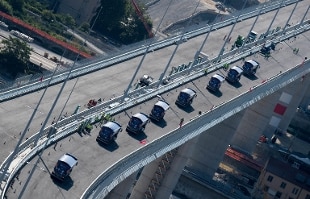- Genova. Mayor Bucci: "The bridge will be inaugurated on August 3rd"
- Genoa, new bridge will be inaugurated between 1 and 5 August. The testing continues after yesterday's stress test
- Ponte Genova, Conte's ultimatum to Autostrade: make an acceptable proposal or revoke it
- Ponte Genova, Consulta: legitimate to exclude Autostrade per l'Italia
- Ponte Genova, De Micheli: "I confirm that it will be managed by Autostrade"
Share
27 July 2020 The urgency to start the works for the restoration of the motorway section and the doubts on the appropriateness of entrusting them to the concessionaire in light of the seriousness of the collapse of the motorway viaduct called Ponte Morandi, as well as the first results of the administrative investigations in this regard: these are the in a nutshell, the reasons that led, with the Genoa decree, to the expulsion of Aspi from the demolition and reconstruction of the bridge.This is what we read in a passage of the reasoning with which the Constitutional Court, in the sentence n. 168 filed today (editor Augusto Barbera), explains why the Genoa Decree challenged by the Liguria Tar was not constitutionally declared illegitimate.
The ruling ends with three statements of groundlessness and four of inadmissibility. In particular, the question concerning the charge to Aspi of the costs of the reconstruction and expropriations is inadmissible, since the TAR did not clarify the reason for which the charge was made: whether outright, or as a mere provisional advance, pending any investigations regarding the concessionaire's liability for compensation.
The ruling explains that the expulsion of Aspi from the demolition and reconstruction of the viaduct was accomplished through two steps. First of all, underlines the press office of the Court, the legislator has foreseen that, for these activities, the convention of which Aspi is a party was not activated and, therefore, that the obligation of the latter to provide the services was not enforced demolition and reconstruction, despite the dealership's willingness to do so.
Secondly, the extraordinary commissioner, in charge of carrying out the works, of starting a negotiation with the motorway company for the assignment of the works, was precluded. The Court held that each of these two passages was based on objective reasons, congruent or connected with those explained, albeit not always in a clear way, in the decree-law.
The decision not to activate the agreement depended both on the urgency of starting work to promptly restore an essential stretch of motorway for connections in the region, and on the doubts that arose about the opportunity to entrust those works to the concessionaire, in light of the seriousness of the event occurred and the first results of the administrative investigations.
On the other hand, concludes the Consulta press office, "the exclusion of Aspi from the tender for the award of the works, in addition to being a natural consequence of this, is consistent with the European legislation on public contracts and is it has also served to open up the highway construction sector to competition ".

